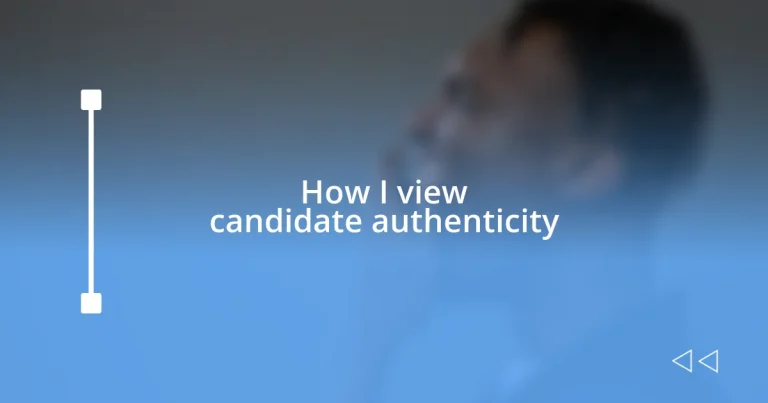Key takeaways:
- Candidate authenticity, characterized by honesty and vulnerability, fosters trust and strengthens professional relationships, enhancing team dynamics and organizational culture.
- Evaluating authenticity involves observing candidates’ narratives, body language, and genuine passion, allowing for deeper insights into their character and potential fit within an organization.
- Creating a comfortable interview atmosphere promotes open dialogue, enabling candidates to share their experiences and motivations, which in turn benefits long-term collaboration and innovation within teams.
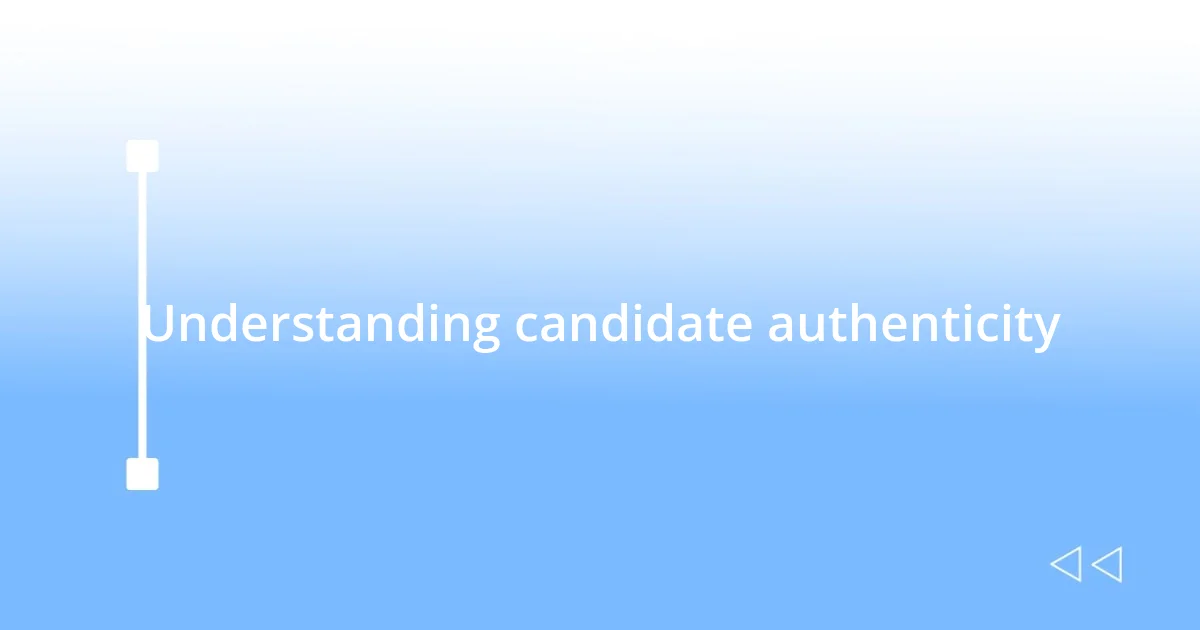
Understanding candidate authenticity
Candidate authenticity is more than just a buzzword; it’s a blend of honesty, integrity, and a genuine representation of oneself. I recall a time when I interviewed a candidate who shared personal stories about their struggles. Their vulnerability resonated with me, making them stand out as someone real and relatable.
When I assess authenticity, I often ask myself, “Is this person presenting their true self, or are they just rehearsing a script?” Observing how a candidate interacts with others can reveal their authentic nature. I once saw a candidate light up when discussing their passions, and that enthusiasm felt contagious; it was clear they were being true to themselves.
It’s important to recognize that true authenticity offers a sense of connection with others. I feel this personal resonance because authenticity creates trust, which is the foundation of any successful professional relationship. Have you ever felt a sense of comfort and safety around someone who was genuinely themselves? That’s the power of being authentic.
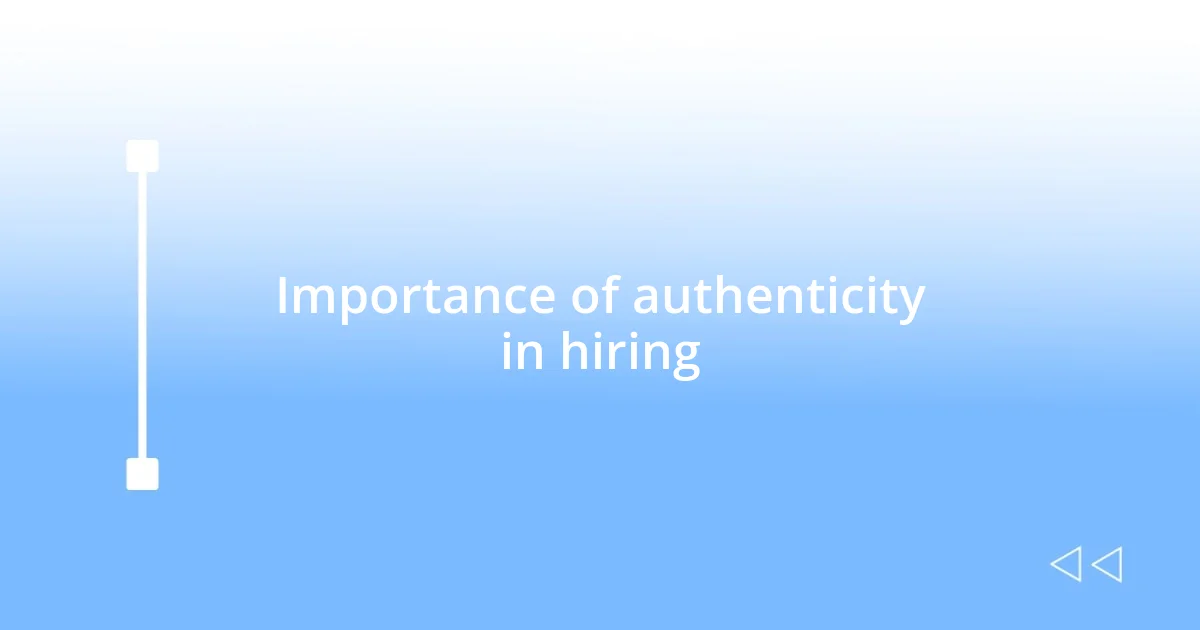
Importance of authenticity in hiring
Authenticity in hiring is crucial for building a strong organizational culture. I’ve experienced firsthand how hiring authentic candidates fosters openness, leading to a supportive work environment. When individuals feel free to be themselves, collaboration improves, and innovation thrives.
In my previous roles, I noticed that teams featuring authentic members often performed better. I remember a particular project where a colleague openly shared her ideas, drawing from her personal experiences. This honesty sparked creativity within the group and encouraged others to contribute more freely, resulting in an unprecedented outcome.
Moreover, authentic candidates tend to demonstrate resilience and adaptability. I once worked with a teammate who faced challenges head-on, thanks to his genuine approach. His ability to communicate openly about difficulties not only inspired trust among our peers but also helped us tackle hurdles as a united front. This kind of authenticity can be a game-changer for team dynamics and overall success.
| Authenticity Aspect | Impact on Hiring |
|---|---|
| Trust Building | Fosters a safe space for honest communication |
| Team Cohesion | Encourages collaboration and shared ideas |
| Adaptability | Promotes resilience in facing challenges |
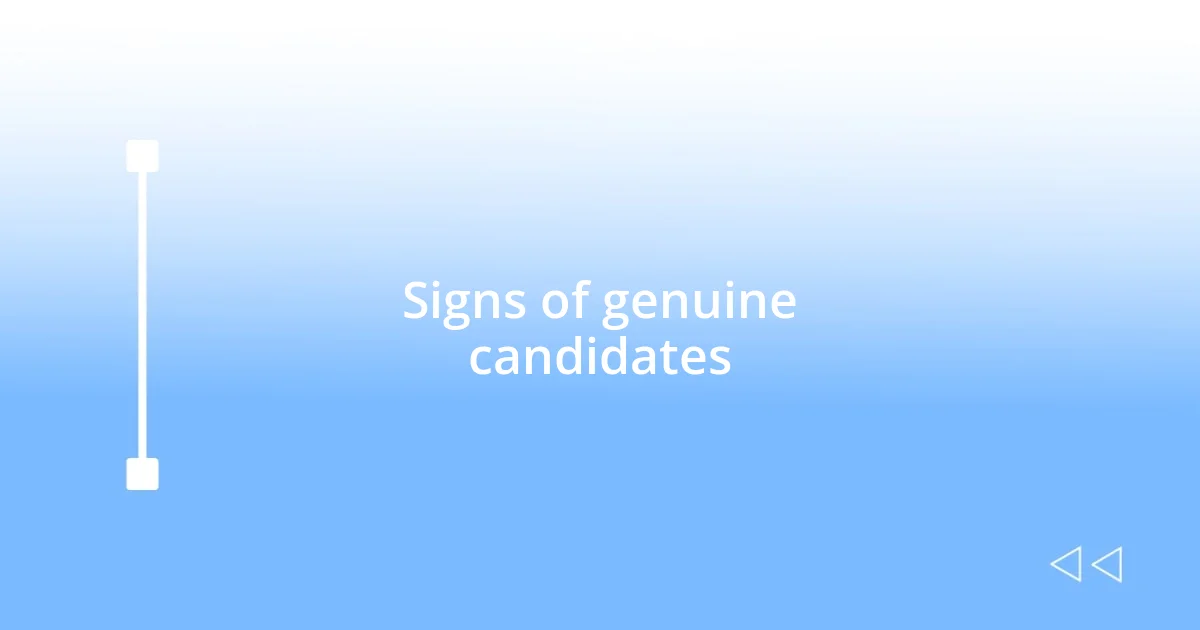
Signs of genuine candidates
When I evaluate candidates, there are specific traits that signal their authenticity. One sign I notice is how they discuss their experiences. For example, I once interviewed a candidate who shared not only their achievements but also the failures that shaped their journey. Their openness about setbacks felt refreshing, making it evident they were comfortable showing both sides of their professional persona.
Here are some indicators I look for in genuine candidates:
- Honesty: They share their true selves, discussing flaws and lessons learned openly.
- Passion: Their enthusiasm about their work is palpable, highlighting what truly drives them.
- Consistency: Their stories align across different conversations, reflecting a coherent self-image.
- Empathy: They show a genuine interest in others’ experiences and perspectives, fostering a sense of connection.
Another compelling sign of authenticity comes from their body language. I remember a candidate who, while discussing their values, maintained eye contact and had an open posture. That non-verbal communication conveyed sincerity, making it easy to trust what they were saying. When candidates genuinely share their beliefs and values, it builds a bridge of trust that is crucial during the hiring process.
In assessing authenticity, I often look for these qualities:
- Body Language: Open posture and eye contact reflect comfort and confidence.
- Vulnerability: Willingness to discuss challenges or uncertainties can be a powerful indicator of authenticity.
- Self-Awareness: They possess an understanding of their strengths and weaknesses, demonstrating personal growth.
- Authentic Communication: They prioritize clarity and honesty, avoiding unnecessary jargon or pretenses.
Finding these signs not only enhances the interview process but also fosters a deeper connection, guiding me toward candidates who will enrich the workplace.
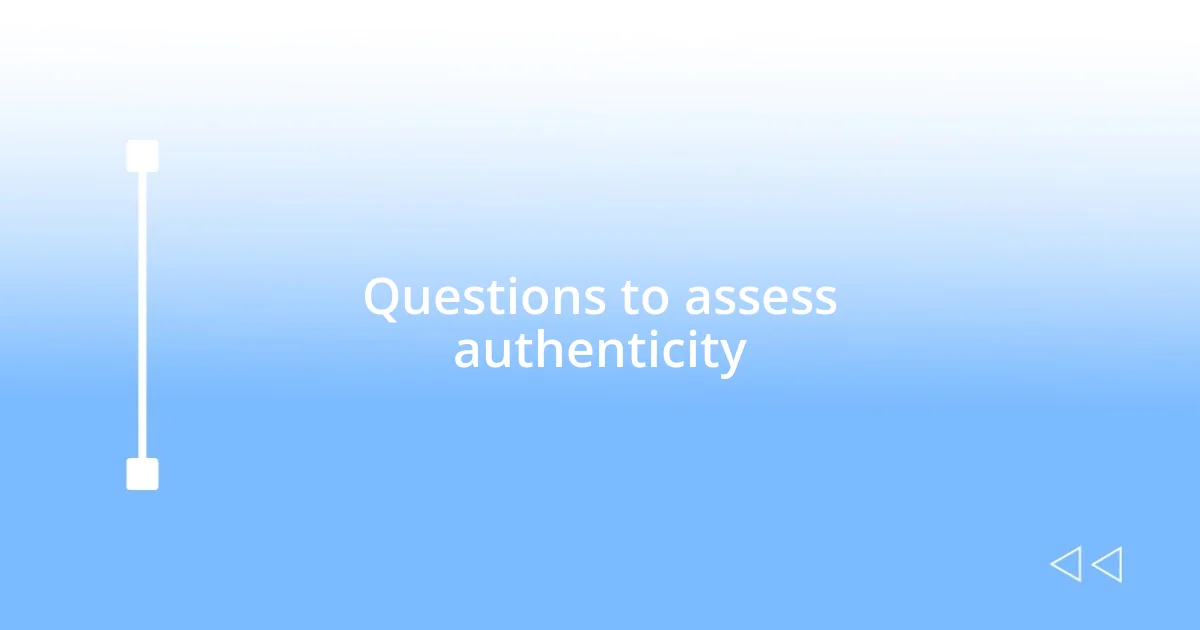
Questions to assess authenticity
To truly gauge a candidate’s authenticity, I often find it valuable to ask open-ended questions that encourage reflection. For instance, when I inquire about a challenging situation they faced and how they navigated it, I’m looking for more than just the surface details. I want to hear about their thought process, the emotions they felt, and what they learned from the experience. This kind of storytelling reveals their vulnerabilities and genuine self-awareness, which is critical for authenticity.
Another question that tends to spark meaningful dialogues is about their motivations. I’ve asked candidates what drives them to excel in their career and how that aligns with their personal values. When they articulate their passions, I can sense whether they are being candid or simply giving a rehearsed answer. I distinctly remember a candidate who spoke about their desire to make a positive impact on society. The passion in their voice was palpable, making it clear they weren’t just looking for any job, but rather a meaningful role that resonated with who they are.
Lastly, I appreciate when candidates can connect their past experiences with their future aspirations. A question like, “How does your previous work experience shape your vision for the future?” not only uncovers their journey but also illustrates how authentic they are in their ambitions. In one memorable interview, a candidate connected their earlier roles in crisis management to their keen interest in disaster response technology. The seamless flow of their narrative gave me an immediate sense of trust, indicating they genuinely believed in the value of their work. Such responses can illuminate the depth of a candidate’s character and their potential fit within an organization.
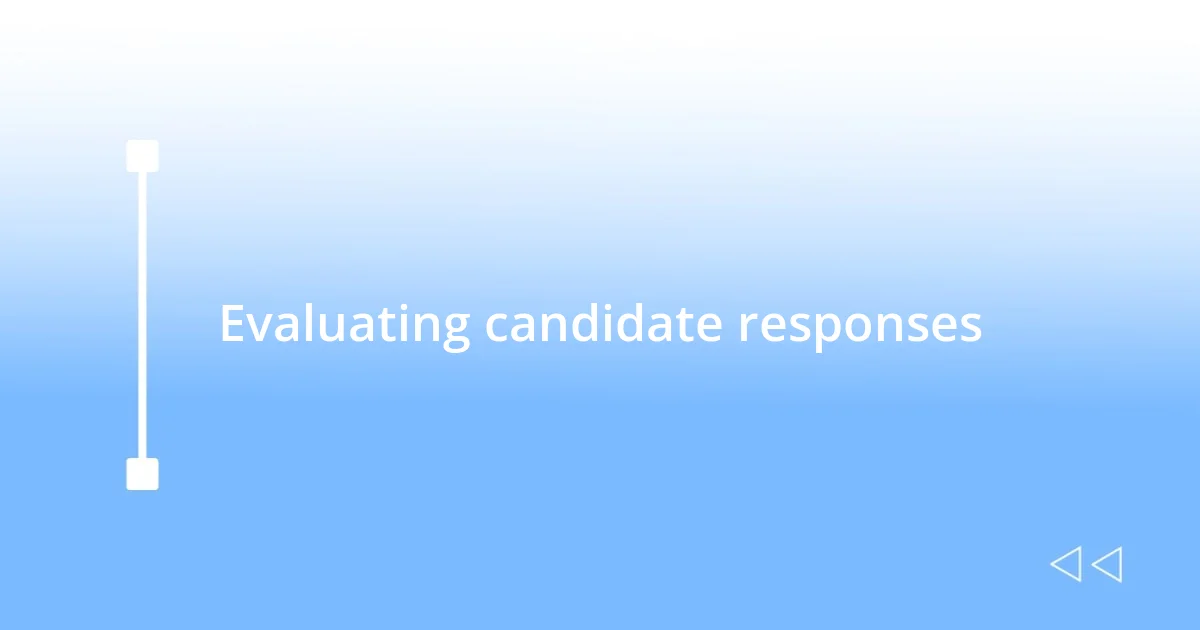
Evaluating candidate responses
When I evaluate candidate responses, I pay close attention to the stories they share. I recall one particular interview where a candidate spoke about a project that didn’t go as planned. Instead of glossing over it, they detailed their missteps and what they learned. That degree of honesty not only showed their willingness to learn from failure but also made me wonder: How many candidates ever share their misfortunes so candidly? It’s a rare glimpse into their real character.
I often find that how candidates connect their past to their present reveals a lot about their authenticity. There was an occasion when a candidate told me about a time they volunteered at a local shelter, which sparked their interest in community engagement. Their enthusiasm was contagious, and I couldn’t help but think, if they care that much about their community, how will they contribute to our team? This connection between their values and experiences often leads to deeper insights about their motivations.
Listening to a candidate’s response is about more than just words; it’s about reading between the lines. During another interview, I noticed how a candidate’s passion soared when they talked about mentorship. They described how helping others shaped their career, and I felt a genuine excitement in their voice. It made me reflect on my own mentorship experiences. I’ve realized that candidates who express a desire to uplift others usually embody a collaborative spirit that can significantly benefit a workplace. Their responses often illuminate traits that align with the authentic culture we’re trying to build.
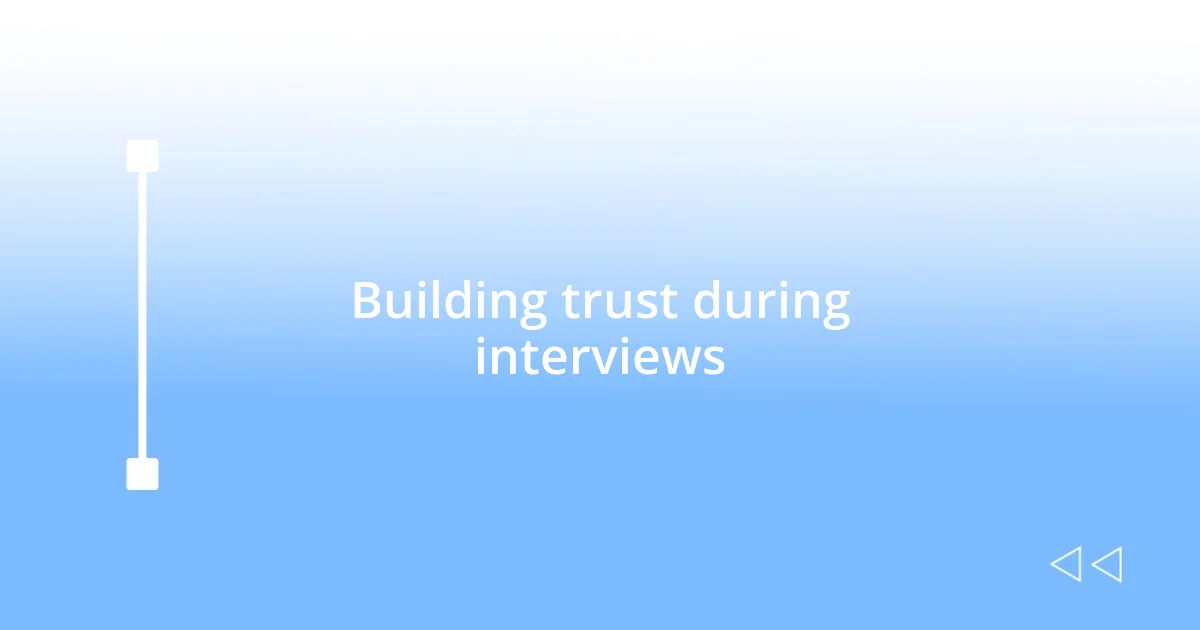
Building trust during interviews
When conducting interviews, I’ve found that creating a comfortable atmosphere can significantly enhance trust. I remember one interview where I shared a lighthearted story about my own work mishap. This simple act broke the ice and made the candidate feel at ease. They responded by opening up about their own challenges, demonstrating that vulnerability can be a powerful bridge to building authenticity.
I also pay attention to non-verbal cues during interviews. I once interviewed a candidate who, despite giving well-structured responses, had a fixed gaze downwards. I sensed a disconnect between their words and body language. It made me reflect: How often do we trust what we can’t see? When candidates exhibit congruence between their verbal and non-verbal communication, it fosters a deeper level of trust, making the conversation feel richer and more genuine.
Lastly, I actively encourage dialogue rather than just one-sided responses. One time, I asked a candidate how they felt about a particular challenge in our industry. Their thoughtful response sparked a robust discussion about industry trends, revealing their passion and expertise. I walked away thinking, “Isn’t it refreshing when candidates genuinely engage?” This reciprocal exchange not only builds trust but also gives me an authentic glimpse into who they are beyond the resume.
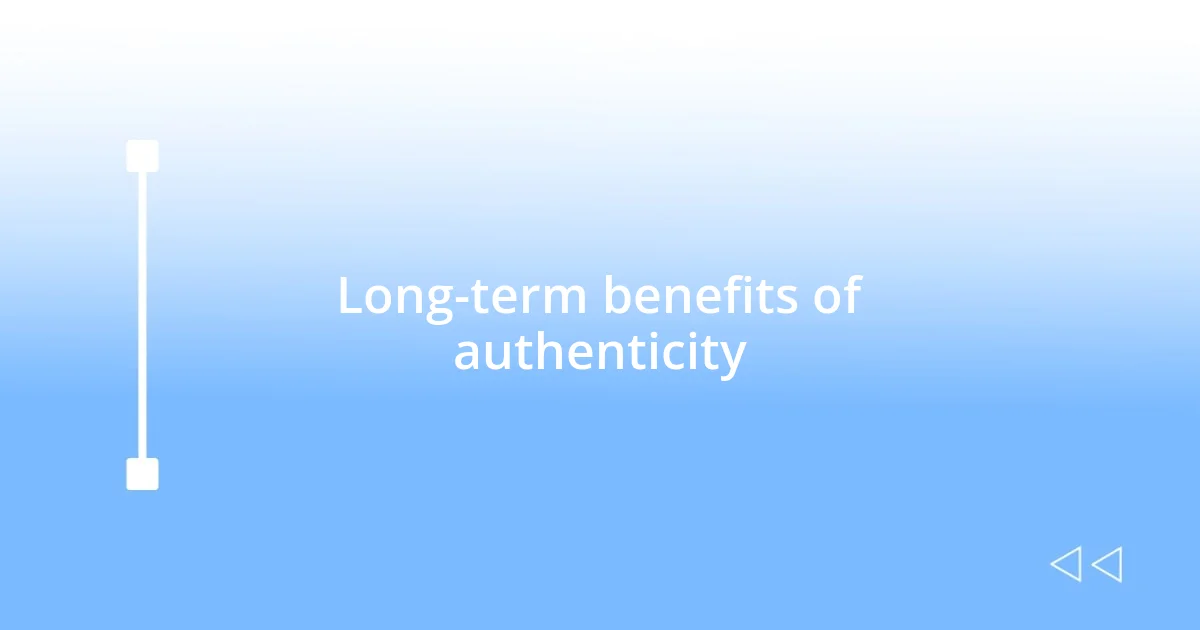
Long-term benefits of authenticity
Authenticity in candidates often translates into long-term benefits for both the individual and the organization. I recall one candidate who openly shared their journey of overcoming self-doubt. This honesty not only showcased resilience but also offered a glimpse into how they’d tackle challenges in our workplace. It made me wonder, wouldn’t we all benefit from embracing our vulnerabilities?
When authenticity is at play, it fosters an environment of open communication and trust. I once worked alongside a colleague who was unapologetically themselves, sharing both their successes and struggles. Their genuine nature encouraged our team to feel comfortable doing the same, creating a culture where ideas could flow freely. How often do we see that level of collaboration emerge from simply being real?
The ripple effect of authenticity extends beyond just the individual—it can elevate an entire team. I remember when a leader I respected anchored meetings in transparency, addressing failures and celebrating honest feedback. This approach didn’t just bond us; it inspired everyone to bring their true selves to the table. Isn’t it astonishing how authenticity can transform the dynamics of a workplace for the better?












